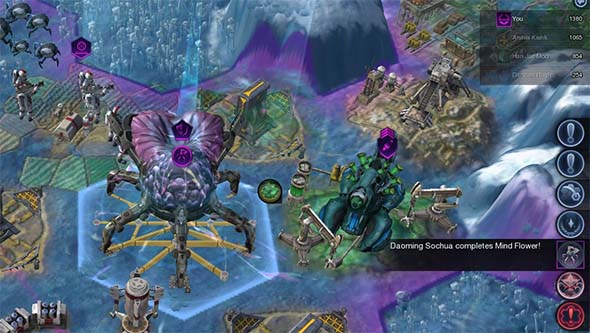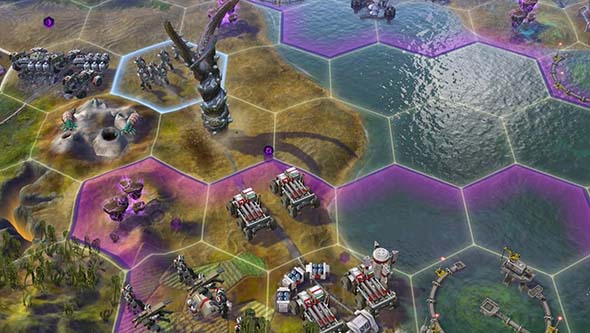
I started writing this post months ago (back in 2015, I think) - long before I had any inkling of the impending release of Civilization VI. This post may be entirely moot now that Civ VI has been announced, and it seems unlikely to me that Beyond Earth will see further expansions. However, I still want to present these ideas, so I've re-written this post to be less speculative and more retrospective. Even if these ideas aren't fated to be implemented for Beyond Earth, it's still an opportunity to look at a way in which the game could have differentiated itself from Civ V, and they could serve as a template for future Civ titles (maybe even Beyond Earth 2) or for modders. Maybe I'll even mod it in myself if I get time and motivation.
Civilization: Beyond Earth really struggled to separate itself from Civ V. The expansion, Rising Tide takes steps to address this with some of its new gameplay mechanics and revised diplomatic engine. Sadly, these efforts don't really address one of the underlying, fundamental, disconnects that the game has with me:
"One of the things that bothered me about Beyond Earth was the way that the victory conditions create an unnecessary competition between the different civs. Aren't we all just colonists from the same earth who are supposed to be trying not to repeat the mistakes of the past? Aren't we trying to preserve the human race? Without the various civs starting the game with any sort of pre-established ideology or agendas, there's no reason for them to be competing with one another. Without a genuine shared victory, there's also no systems in place to share your colonial success with your fellow colonies. The net effect is that once you've defeated the challenge of taming the planet and [one way or another] eliminating the aliens as a threat to your expansion, then the rest of the game is a competition between civs to be the first to reach any of the [mechanically satisfying and varied, yet intellectually vapid] victory conditions."
- from my Rising Tide review

Heck, why are we competing to begin with?
Despite being mechanically different from Civ V's victory conditions, Beyond Earth still fell into the trap of being fundamentally, unnecessarily tribalistic and competitive. I don't know if this is supposed to be some kind of sad, fatalist message that Firaxis is writing into Beyond Earth: that we are doomed to repeat the mistakes of the past. This isn't Fallout. I hope that Firaxis' designers aren't that cynical, and that it was an unintentional emergent consequence of design.
This may seem like a small, trivial, superficial issue, but it's not. Regular Civilization is easy to buy into because it's based [loosely] on established history and uses real-world characters and states that most people are already familiar with. Buying into the theme of Beyond Earth is just so much harder because there's so much of the game that just doesn't make sense, or which doesn't really follow from the opening cinematic or the game's flavor text. This is why Alpha Centauri went to such great pains to personlize the leaders, and to turn them into charicatures of established real-world ideologies and standard sci-fi tropes. These are factions with established goals and agendas that we can understand, and we can buy into their conflicts. Beyond Earth doesn't have that, and so not only do its leaders fall flat as characters unto their own, but the entire basis upon which the game's core conflicts and victory conditions are based start to fall apart as well.
In any case, I think that one of the best ways that Beyond Earth could have truly separated itself from Civ V (mechanically and thematically) would have been to change the competitive nature of the victories and introduce truly cooperative victories, or maybe even a "players versus map" victory type. And I want to emphasize from the start that I haven't put nearly as much time into Beyond Earth as I have into Civ V. I'm by no means an "expert" in the game. So feel free to take the following suggestions with a grain of salt. I admit that these ideas simply might not work, but I still think that it's worthwhile to explore the possibility space that this game could have offered.
Affinity victories
The affinity system of Beyond Earth has the potential to foster truly cooperative victories. The victories are structured in such a way that it would make sense for multiple civs sharing the same affinity preference to all contribute to that affinity's victory. Instead, the different civs don't work together to accomplish these victories. They make independent attempts to complete potentially the same victory, by building the same infrastructure, and performing the same task to meet the same goal. Only the first civ to achieve the conditions is granted victory. It makes sense that civs with differing affinities should be opposed to each other because they have fundamentally different perspectives on how humanity's future should develop. But why should we be forced into opposition if we share the same philosophy and goals?

I can lose the game because somebody achieves my desired victory goal before I do.
I would like to propose a system in which civs that share an ideology can contribute to their respective victory condition cooperatively. I can think of two ways this could have been handled:
- Add new, cooperative victories whose cost (or risk) scales up based on the number and strength of the civs participating. Therefore, you can work together towards a shared victory, but the conditions are harder to meet due to the fact that more civs are contributing. There could still be affinity victories that a single civ can pursue at a lower cost, but perhaps pursuing them can incur diplomatic penalties with other civs of the same affinity (because you're being selfish or reckless).
- Replace the existing victory conditions with shared victories so that a player wins by either converting other civs to share the player's preferred affinity and work together towards victory, or by needing to single-handedly overpower all members of the opposing affinities.
Now, I'll discuss how each of the affinity victories could have been designed as cooperative victories. I'm going to try to keep the proposals as simple and similar to the current game as possible. Basically, each victory's wonder would be transformed into a "project" similar to Civ V's International Projects. Each civ that meets a certain prereq of affinity level would be able to contribute to such a project. Also, just like how Civ V's International Projects had different rewards for meeting different production contributions, each civ in Beyond Earth should have to meet some bare minimum of contribution in order to continue to be eligible for the shared victory. This contribution could come in several different forms. It could be raw production points invested in the wonder, or it could be volunteering your supply of strategic resources that are required to build the wonder, and so on.
Harmony "Transcendence" victory
Harmony's "Transcendence" victory currently involves a single civ researching a series of techs that allow them to construct a Mind Flower in order to develop a Cognitive Link that allows humans to tap into the central hive mind of the planet and its aliens. The goal is to link all human minds to the shared consciousness of the planet. It's an outcome that affects everybody on the planet, and so it seems like the most logical and intuitive candidate for a shared victory. If I build the Mind Flower, then why should other harmony civs lose the game? Aren't they trying to do the exact same thing and connect us to the exact same shared consciousness?

Harmony's Mind Flower and Transcendence is probably the most intuitive candidate for a cooperative victory.
Similar to the International Projects of Civ V: Brave New World, the Mind Flower should have been a joint project / wonder that all civs with a certain threshold of Harmony affinity can contribute to. Obviously, the cost should go up, and should scale based on game speed and maybe even the number of players in a game. Further, all players' Xeno Sanctuaries and Mind Stems should contribute towards victory. In this sense, an attack on any Harmony player is effectively an attack on all Harmony players, and part of the challenge comes from superior powers having to dedicate resources to propping up weaker, allied powers in order to ensure that they aren't picked on as the "weakest link" by rival affinity powers.
This victory could have been made more challenging with more aggressive aliens, making miasma more dangerous, and then scaling the cost of the victory up based on how hostile the participating players have been with the aliens over the course of the game, and based on how much miasma they've removed from the map (or how much terraforming / forest cutting they've done in general). Players who were excessively combative with the aliens (either by choice or by circumstance), or whom altered too much of the planet's surface, may then become virtually ineligible to pursue this victory since their participation would drive the cost up prohibitively high. This would also help to add an element of emergent narrative and organic consequence to the game by making your in-game actions relevant to your affinity victory progress. Your own actions would discourage you from pursuing a harmony victory, and therefore encourage you to devote research and affinity points towards purity or supremacy. In addition, other Harmony players might oppose a fellow Harmony player who has been hostile to the aliens because that player is driving up the cost of victory for everybody.
Players who clear miasma or fight the aliens could increase the cost of Transcendence victory,
thereby making their participation prohibitively expensive and encouraging them to pursue other affinities or victories.
I think that a solo Transcendence victory option could have been easily implemented as a supplement. There could have been a cheaper Mind Flower variant that only connects the single building civ's population to the hive mind. This could, thematically, link your colonist's minds to the planet, but also prevent the other Harmony civs from being able to join the cognitive link. Once the Cognitive Link is setup, there could be a countdown to a point where your cognitive link becomes irreversible without also killing the planet. If you survive that countdown, you win. The number of Mind Stems and Xeno Sanctuaries that you control would reduce the time it takes for this victory to be complete. This variant Mind Flower wonder would be easier to build, but once built, you'd have to contend with all the other civs (including your fellow Harmony civs) attacking you to sever your link to the planet. To help you combat this, your Mind Flower could provide you with the ability to control all the alien life on the planet - or, at the very least, all aliens and nests would provide you with free line of sight and become hostile to all other players.
Purity "Promised Land" victory
Purity's "Promised Land" victory currently involves a mass relocation of earth's population to the new world. It requires re-establishing contact with earth via a Lasercom Satellite, building an Exodus Gate, and then summoning a certain number of earth colonists to the new planet and settling them in open locations on the map.
This one is a bit different from Transcendence because there could be a certain degree of nationalistic, social, or economic favoritism that makes the victory exclusive. For example, if ARC only brings American colonists to the Promised Land, and French/European colonists are turned away, then it makes sense that Franco-Iberia doesn't necessarily win also, even if they specialized in the Purity affinity. This is generally how I assume this victory must work, because that's the only way that it really makes sense in context. But the associations with the nation-states of Old Earth seems so loose and superficial that I don't buy into that as being a necessary restriction. So why can't multiple Purity civs cooperate in order to bring all of earth's population to the Promised Land (or at least, their respective constituents)? After all, once earth's colonists are relocated, should it really matter who relocated them? They're here, aren't they?

Civs are more influenced by their in-game trait and affinity development than by their socio-ethnic origins.
As such, I think the Promised Land victory could have worked in a similar manner to the co-op Transcendence victory described above. The Exodus Gate can be a project that all Purity civs allocate resources to build. the cost of the gate would be scaled up based on game speed and the number of civs in the game. Once built, the Exodus Gate starts summoning earth settlers as normal, except that control of the settlers could alternate between the different Purity civs. I place one settler, then my Purity ally places the next, and so on. Alternatively, each Purity civ could have its own Exodus Gate that brings in that civ's own constituent earth settlers. Again, an attack on one purity civ or its colonies would be an attack on all.
Like with Transcendence, this could also allow for a "selfish", single-player victory. If a single Purity player builds their own Exodus Gate, and summons only his or her own people from earth, then they could potentially claim victory on their own. But what's stopping the other Purity players from finishing their own Exodus Gates and resettling their constituents also? Maybe this solo warp gate is unstable, and collapses the link to earth; thus, preventing other players from bringing their constituents over.
Supremacy "Emancipation" victory
This is the one affinity victory that I can see as being a solo victory. After all, you're going back and conquering earth, and the other powers of the new planet aren't necessarily affected by such a conquest. So I don't really mind this being a mutually-exclusive victory condition that is un-shared. But that still doesn't mean that you can't bring your fellow Supremacy allies as reinforcements.

Supremacy is a very militaristic victory
that is suited to a solo victory.
For the sake of consistency, if any affinity victories have shared conditions, then they should probably all have them; otherwise, we end up with awkward imbalances in the power between different affinities. Being a more military-themed victory than the others, a shared Emancipation victory should require that all Supremacy players be friendly (or allied) with each other and have open borders. There could be a single Emancipation Gate that all Supremacy players send units through (this is where the open borders requirement comes in), or each Supremacy civ can build its own gate. Each Supremacy civ would send its units through the gate(s), and there should be some thresholds of unit strength that must be sent in order to qualify for victory.
What about hybrid affinity victories?
With the Rising Tide expansion came the inclusion of hybrid affinities, but Firaxis did not put in the extra effort and complexity of hybrid affinity victories. But since I'm talking about changing the victory conditions somewhat, let's talk about the possibility of hybrid victories. Since a hybrid affinity player can max out their hybrid affinity without necessarily reaching the criteria to be eligible for a single affinity's victory conditions, there is room for such a design consideration.
As it stands now, the hybrid affinities don't necessarily feel like a genuine goal; instead, they feel more like an accidental condition. I focused on Purity, but I also picked up enough Supremacy techs to be high level in that, so now I'm hybrid Purity-Supremacy. In the joint victory models outlined above, hybrid players get left out in the cold unless they decide to board one bandwagon or the other. But if joint victories are possible, then a hybrid player would be in a position of wanting to help other players of either (or both) of the affinities that the player developed.
In context of the game universe, if all Harmony players benefit from the Mind Flower's activation, and all Purity players benefit from the Exodus Gate's completion, then what's stopping a hybrid Purity-Harmony player from achieving a victory if both conditions are met? e.g. We resettled all the new-earth settlers and then connected them to the cognitive link. If the game included some extra phase in which players who have achieved victory conditions must maintain those conditions, that would open up the possibility of a second affinity victory also happening. In that event, any hybrid players could also win.
The question is: do single-affinity civs still win if a second affinity victory is also achieved? To be honest, I'm not sure. I'm also not sure if such a buffer period would be worth playing, or if it would just drag out the game. Probably the latter. So I'm not exactly sure what to do with hybrid affinities, and am open to suggestions.
Contact Victory
The Contact victory is affinity-agnostic. Any civ can achieve it regardless of which affinities (if any) they have leveled in. This victory is also at least partially dependent on random luck. You must find a fragment of "The Signal" by conducting an expedition in a Progenitor Ruin; otherwise, you have to research a couple techs to achieve the same goal. If you acquire The Signal, you may then launch a Deep Space Telescope, research Transcendental Math, and then build the Transcendental Equation project, and then build another project (Decode the Signal). Once that's done, you must build the Beacon wonder, spend a large sum of energy to activate it, and then wait for the aliens to show up. Phew... While the affinity victories are easy to turn into cooperative victories, there's also no reason why the Contact victory could not also have the potential for co-op.

There is a small random chance that a Progenitor Ruin might give you a head start towards the Contact Victory.
I'm not sure if the first part of The Signal is available in every game, or if there's a random chance that it will even show up. I've actually been saving my Contact victory attempt for a game in which I discover the Signal from a ruin. That hasn't happened yet, so I still haven't attempted a Contact Victory, and so I'm not super familiar with its intricacies. This is, in fact, one of the reasons why I've been sitting on this article for so long: because I was hoping to get lucky with a Progenitor Ruin, but it never happened. I'm confident that this victory could also be made cooperative by making the Transcendental Equation, Decode Signal, and Beacon all be international projects similar to the above proposals for the Mind Flower, Exodus Gate, and Emancipation Gate. I would propose that at each step, only the civs that achieve a minimum amount of investment in one project will be eligible to contribute to the next step. In this sense, you're actually rewarded for getting the other players to cooperate with you. After all, don't we all benefit from a successful SETI program?
The question then becomes "Why would anybody not pursue the Contact Victory? It seems like an easy way for everybody to win. In which case, why play the game? Well, obviously, anybody who fails to meet the requirements to continue the project at any step would be put in a position in which they'd have to reach for their own victory condition, and would likely be at odds with the players continuing to pursue Contact. Making the aliens more aggressive, and then scaling up the cost of Contact progress based on the hostility between you and the aliens could maybe accomplish this by creating a degree of xenophobia. But that would run the risk of making Contact act like a companion victory to the Harmony affinity, which conflicts with its affinity-agnostic role.
Inspiration from Civ's board game roots: Player(s) versus the planet
The game is supposed to be about a colony of humans taming an alien world (or adapting to live on that world). However, all the victories are geared towards competition between the different civs. Colonizing your first few settlements, exploring the world, and making the discoveries of resource pods and marvels is always the most fun part of the game for me. But that ends up not really being the point of the end game. The first half is about colonizing an alien world; the second half is about civs competing against each other to be the first to achieve some goal. It reminds me of how Colonization was all about settling colonies, harvesting resources, developing them into manufactured goods, and then selling them back to Europe; but then the end game is a military conflict between your colony and your European motherland. That game also made the mistake of having mutually-exclusive victories. Why does the Dutch colony declaring independence nullify my ability to declare independence from England and win the game?
Why aren't there victories involving successfully colonizing the planet? I guess the affinity victories kind of model this? You "tame" the planet with the Mind Flower (Harmony), or by terraforming it to look like earth (Purity), or by using it as a base to re-conquer Earth (Supremacy)... I guess? But none of these victories directly require the player to have to "tame" the planet. The aliens stop being a threat if you ignore them - especially if you reversed the polarity of your ultrasonic fences and granted your trade units immunity from alien attacks. After the initial exploration and founding of the first couple of cities, the aliens and map just rarely pose any real threat.
Maybe there could have also been a "Tame the Planet" victory that requires the planet's total human population to reach some threshold, and for some certain threshold of development and infrastructure to be reached by all colonies. This would allow for cooperative victories in a style similar to the "players versus the board" paradigms of some cooperative or semi-cooperative board games. There are plenty of board games that follow such a paradigm, and they were - in fact - my primary inspiration for this entire article. Games like Battlestar Galactica, Pandemic, and Arkham Horror have pulled this off quite successfully. And other semi-cooperative games like Mansions of Madness or Descent: Journeys in the Dark could also act as inspirations. The key to these games is that the board itself (or in Civ's case, the map) must be threatening and dangerous throughout the entire game. More long-term threats from aliens and more environmental hazards (such as spreading miasma, volcanic activity, harsh climates, and so on) could all have been implemented to make the task of simply terraforming the world and settling new cities a challenge in and of itself. And if each affinity required conquering these threats in unique ways, then that could have lead to conflict between players of competing ideologies, as one civ might transform the planet to be more hostile to the others.
Dominating the planet instead of each other
The final victory condition is the basic Domination victory, in which you must eliminate all other players by capturing their capitals. But I thought the whole point of the game was supposed to be colonizing an alien world, not just defeating the other players? Simply eliminating all other players should not be a victory if you are still contending with colonizing the planet and dealing with the alien threat. The domination victory should require the dominating player to not only dominate the other civs, but also dominate the planet.

Over-committing to a Domination Victory should leave you vulnerable to the aliens.
I'm not sure exactly how such a feature should work, but it should involve some way of neutralizing the aliens. This could be done by eliminating them or taming them. The big problem here is that the aliens would need to be redesigned so that they provide some kind of challenge if all other players have been eliminated from the game. After all, we don't want a situation in which you've defeated all the other players and need to grind through a boring slog of finding and destroying all alien nests. This only works if the aliens provide a credible threat, which they currently do not do. In general, aliens should be more aggressive, and should probably become more aggressive against dominating players. That way, if you capture all the other capitals, you'd have to worry about the aliens attacking and destroying your cities.
Could it have worked?
Shared victories (especially for affinity victories) makes sense from a thematic perspective, as it would have given the players the ability to not make the same mistakes that lead to the Great Mistake. It would have also helped differentiate Beyond Earth from Civ V and perhaps given Beyond Earth the more distinct identity that it lacked. But can it work mechanically? That's debatable. Certainly, an implementation similar to what I've proposed runs the extreme risk of making the game too easy and maybe even boring. The mechanics would have to have been structured in such a way as to discourage (or outright prevent) every player from automatically winning the game because everyone just cooperates. That wouldn't be fun or challenging.
But without the built-in, pre-existing ideologies of the leaders of Alpha Centauri, there is really just no good reason for the civs of Beyond Earth to be in automatic conflict with one another. So some kind of shared victory should be allowed.
With Civilization VI announced for release later this year, I doubt that Beyond Earth will get any additional expansions. So it seems unlikely that changes of this magnitude will happen. But that doesn't mean that Firaxis might not consider Beyond Earth 2 later on down the road (or maybe even get the rights to the Alpha Centauri name). If an expansion or sequel to Beyond Earth does get developed, I would hope that it would at least consider the idea of making the colonization of a new world into a shared human endeavor that multiple players can cooperate towards.